|
RESEARCH PAPER SERIES
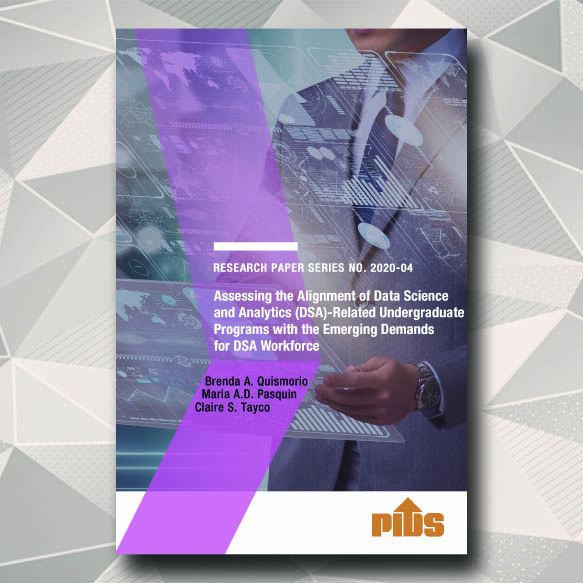 RPS 2020-04:
Assessing the Alignment of Data Science
and Analytics (DSA)-Related Undergraduate Programs
with the Emerging Demands
for DSA Workforce RPS 2020-04:
Assessing the Alignment of Data Science
and Analytics (DSA)-Related Undergraduate Programs
with the Emerging Demands
for DSA Workforce
by Brenda A. Quismorio, Maria Antonette D. Pasquin,
and Claire S. Tayco
The rapid advancement in technology has facilitated far-reaching use of data. This has consequently led to an increasing demand for data science and analytics (DSA) professionals. However, recent studies show that such demand is often not met in many economies. Such DSA skills shortage is claimed to be rooted in the mismatch between the skills the industry demands and the skills academic institutions supply. As the first step in addressing this shortage of industry-ready DSA workers, it is necessary to know the DSA skills demanded by the industry and the DSA skills with which academic institutions equip their students. To do this, the study employed the Analytics Association of the Philippines' Professional Maturity Model, which is based on the 10 APEC-recommended DSA competencies, as analytical framework. The study reveals the misalignment between the demand and the supply of the DSA workforce in the country. Specifically, there are DSA competencies sought by employers that are poorly supplied by existing DSA-related undergraduate programs. To allow the growth and maturity of the still-infant analytics industry, there is a need to address the current lack of a common definition of the analytics profession among stakeholders. The study further endorses the promotion of government-industry-academe linkages to expand the existing market for DSA workforce in the country. Click here to download the research paper.
POLICY NOTE
PN 2020-08: Mitigating Climate Change through Mangrove Forest
by Madonna C. Daquigan
This Policy Note emphasizes the role of mangroves in sequestering significant amount of CO2 by harnessing their potential as CO2 capture and storage (CCS). It zeroed in on the Bued Mangrove Forest Park in Pangasinan and assessed the diversity of its mangroves, sediment carbon, mangrove distribution and carbon stock, and vegetation index. Its analysis revealed that this forest has a potential as CCS, which can lead to notable strategies for climate change mitigation and provide adaptation measurements. To sustain this benefit, it calls for the adoption of policies and regulations that can mitigate the impact of human actions on the forest. It also urged the government to establish a sustainable funding and concrete incentive systems to balance the conservation of mangrove ecosystem and sustainable livelihood for coastal inhabitants and regulations for tourism. Click here to download the policy note. |
November 12, 2020, 1:30–4:00PM
Assessing the Readiness of Filipino Professionals to Participate in the Mobility of Skilled Labor in ASEAN
(watch the livestream on the
PIDS Facebook page)
November 26, 2020, 1:30–4:00PM
Understanding the Role
of the Asia-Pacific Economic Cooperation in Philippine Trade and Investment
(watch the livestream on the
PIDS Facebook page)
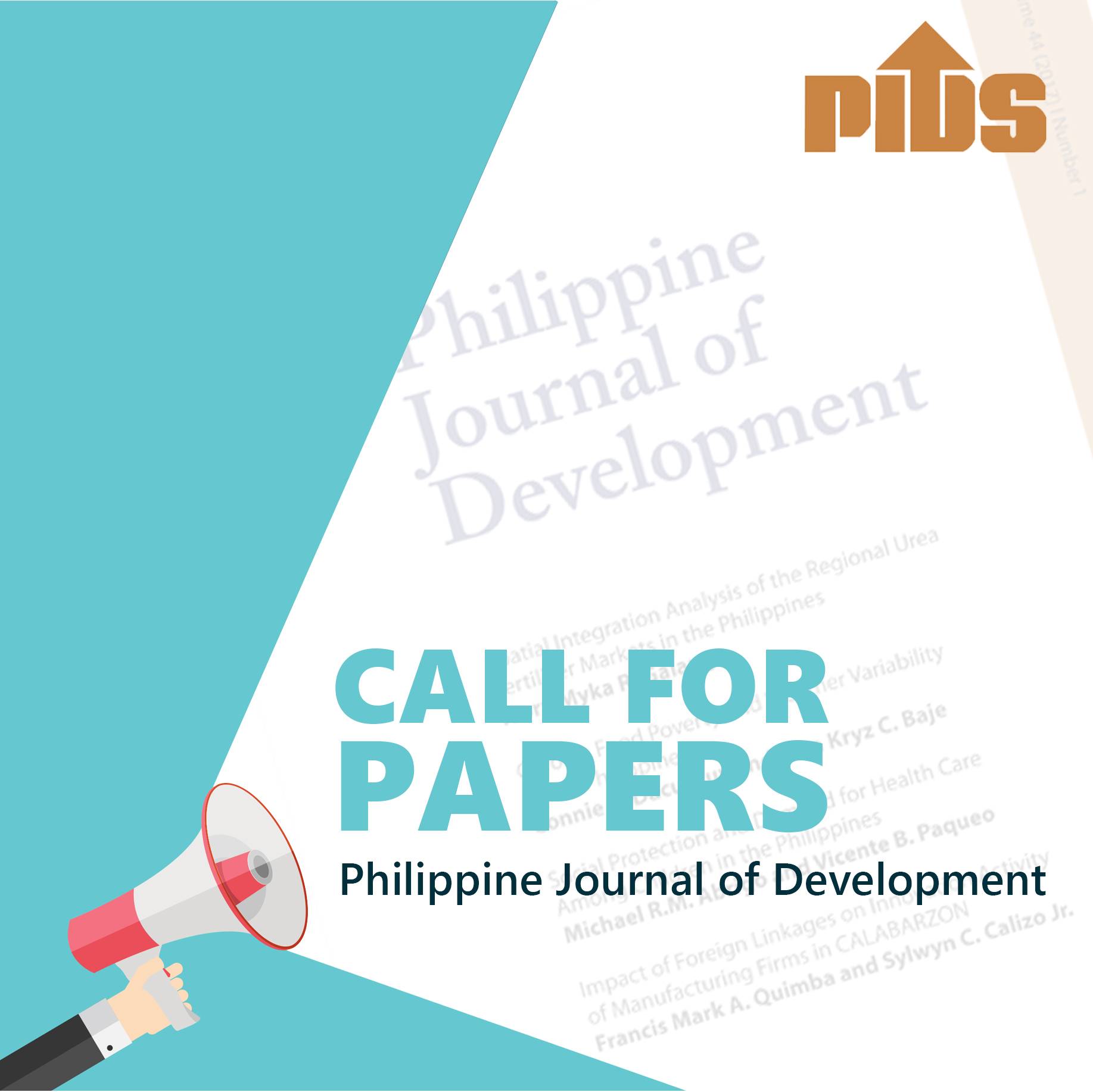
CLICK HERE for the guidelines in the preparation of articles. Submissions and inquiries
may be sent to PJD@mail.pids.gov.ph. |
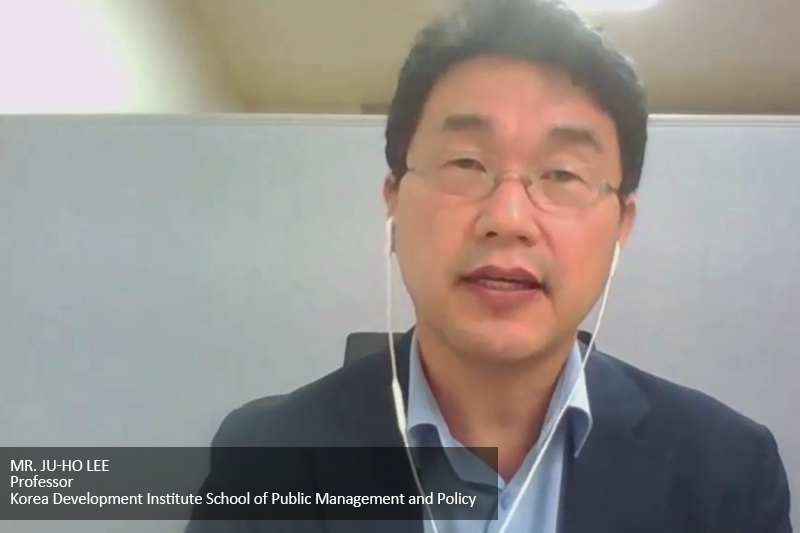 Harness the power of AI in educ amid COVID-19 outbreak--South Korean expert Harness the power of AI in educ amid COVID-19 outbreak--South Korean expert
Artificial intelligence (AI) can optimize learning, especially during the pandemic.
This was highlighted by Dr. Ju-Ho Lee, South Korea’s former Minister of Education, Science, and Technology, in his presentation during the 6th Annual Public Policy Conference (APPC) webinar titled "Institutional Innovations and Reforms under the New Normal" organized by the Philippine Institute of Development Studies (PIDS) recently.
Lee, the current chairperson and CEO of Education Commission Asia (ECA), said that “harnessing the power of AI in education is critical” especially now that many schools have shifted to online classes due to the coronavirus outbreak. READ MORE
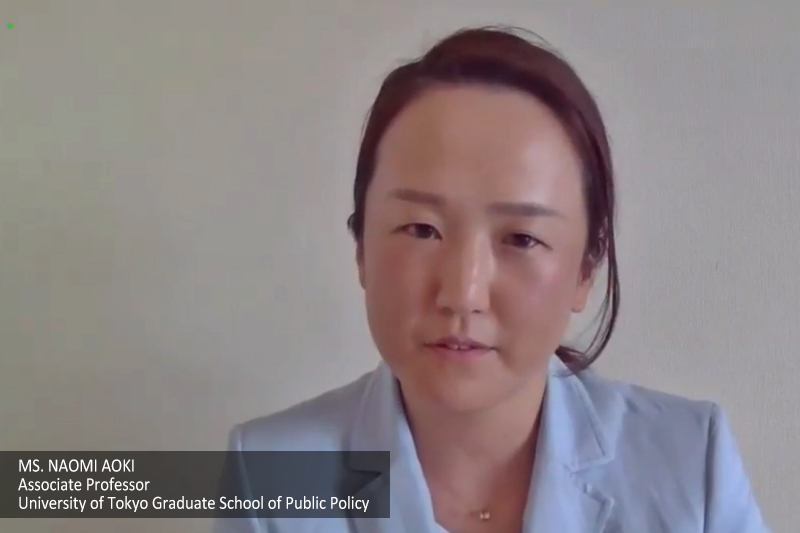 Civil servants must embrace 'new mindsets' in a 'tech-powered new normal'--Japanese expert Civil servants must embrace 'new mindsets' in a 'tech-powered new normal'--Japanese expert
In this tech-powered new normal, the public sector plays a key role both as a regulator of the use of technologies and as a policymaker who decides how to use these tools in the delivery of public services.
Associate Professor Naomi Aoki of the University of Tokyo Graduate School of Public Policy stressed these points during the third of the four-part webinar series of the 6th Annual Public Policy Conference (APPC) organized by the Philippine Institute for Development Studies (PIDS) recently.
She explained that the COVID-19 crisis resulted in the extensive use of technologies in public services and programs such as contact tracing, mask purchase regulating system, chatbots, virus testing, online and digital schooling, telemedicine, and telework, to name a few. READ MORE
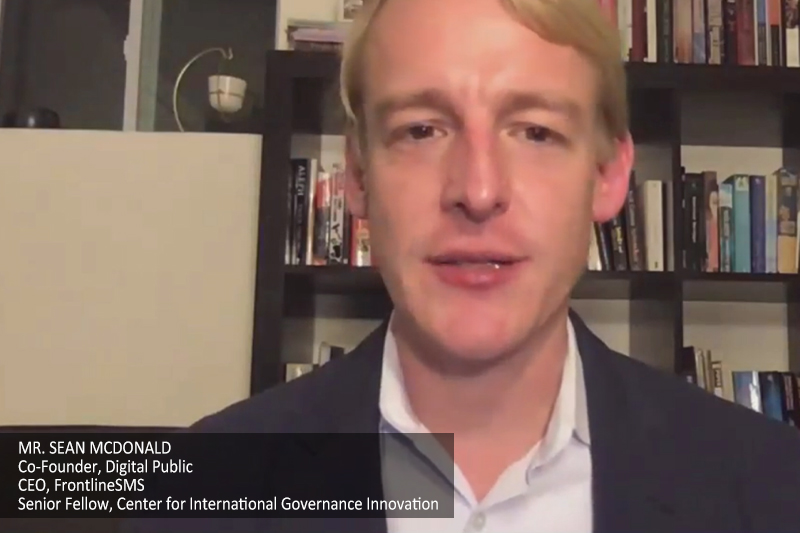 Technology-led responses to COVID-19 and other risks should serve
public interest-- Technology-led responses to COVID-19 and other risks should serve
public interest--
governance expert
As governments look for innovative ways to respond to the COVID-19 pandemic and other risks, a governance expert reminded the public sector to ensure that these efforts should serve the best interest of the people to gain their trust.
Speaking at the 6th Annual Public Policy Conference (APPC) on "Institutional Innovations and Reforms under the New Normal" organized by the Philippine Institute for Development Studies, Sean McDonald, co-founder of Digital Public and a senior fellow at the Canada-based think tank Center for International Governance Innovation, raised key lessons for governments to remember when using technology-led responses in addressing problems in their respective countries. READ MORE
 PIDS bags CSC's PRIME-HRM Award PIDS bags CSC's PRIME-HRM Award
The Philippine Institute for Development Studies (PIDS) received the Program to Institutionalize Meritocracy and Excellence in Human Resource Management (PRIME-HRM) Bronze Award recently.
The Civil Service Commission (CSC) conferred the award to PIDS for achieving the Level 2 accreditation status in its core human resource management systems.
The CSC National Capital Region conducted an onsite assessment at PIDS on May 28 to June 3, 2019.
READ MORE
 Gov'ts urged to collaborate with people, communities to face the 'new normal' Gov'ts urged to collaborate with people, communities to face the 'new normal'
As the COVID-19 pandemic forces people to think of new ways to live under the ‘new normal’, governments must be open to collaborating with its citizens.
This was emphasized by Reboot Co-founder and Executive Director Panthea Lee during the 6th Annual Public Policy Conference (APPC) webinar titled “Institutional Innovations and Reforms under the New Normal” recently organized by state think tank Philippine Institute for Development Studies (PIDS).
“We must rethink how our outdated forms of governance and economic growth have not served us... We need new paradigms and new ways of thinking,” Lee said during her presentation as one of the panelists in the webinar. READ MORE
 Satellite imagery and unconventional data sources are cheaper options Satellite imagery and unconventional data sources are cheaper options
to infer poverty estimates
Satellite imagery and other unconventional data sources may help infer fast and inexpensive estimation of the country’s socioeconomic indicators.
This is according to Thinking Machines Data Science Inc. Founder and Chief Executive Officer Stephanie Sy in her presentation during the webinar titled “Smart Systems for Agile Governance under the New Normal”. The virtual event is the last of the four-part webinar series of the Annual Public Policy Conference organized by state think tank Philippine Institute for Development Studies as part of the Development Policy Research Month celebration held every September. READ MORE
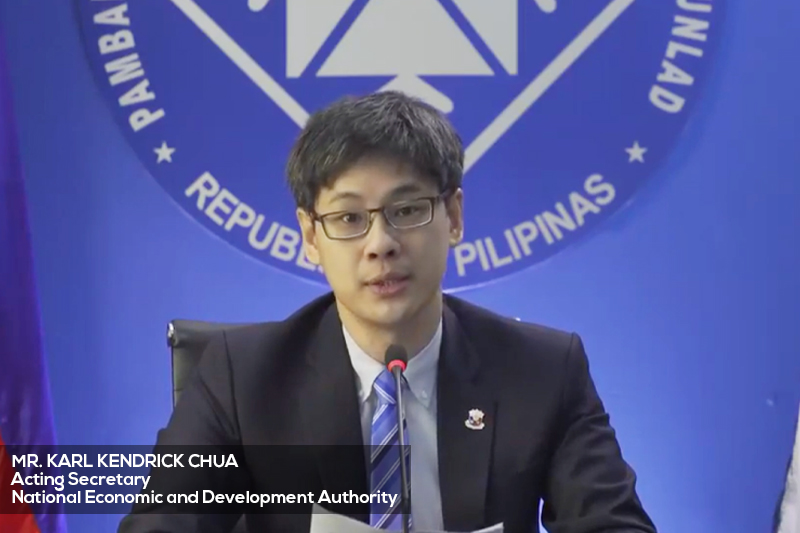 Poverty incidence in PH may rise due to pandemic but reducing poverty still doable--NEDA chief Poverty incidence in PH may rise due to pandemic but reducing poverty still doable--NEDA chief
Secretary Karl Kendrick Chua of the National Economic and Development Authority (NEDA) said that poverty incidence might temporarily climb to 17.5 percent, given the economic slowdown due to the COVID-19 pandemic.
In his keynote speech during the opening of the four-part webinar series of the Annual Public Policy Conference (APPC) held recently, Chua explained that the "contraction of the economy this year may result in the temporary yet slight reversal of the significant gains made" in poverty reduction.
But Chua remains optimistic that the goal of bringing down poverty to 14 percent by 2022 is still doable despite the crisis. READ MORE
 PH must address digital infra gaps to cope with the pandemic, other risks PH must address digital infra gaps to cope with the pandemic, other risks
The Philippine government has to build its digital infrastructure to cope with the pandemic and other similar threats in the future.
National Economic and Development Authority (NEDA) Assistant Secretary Carlos Bernardo Abad Santos made this point during the kickoff forum of the Development Policy Research Month celebration (DPRM) organized by state think tank Philippine Institute for Development Studies (PIDS).
Santos, a panelist in the forum, said the country has to address various challenges in its digital infrastructure to "facilitate innovation across information technologies and smart systems". READ MORE
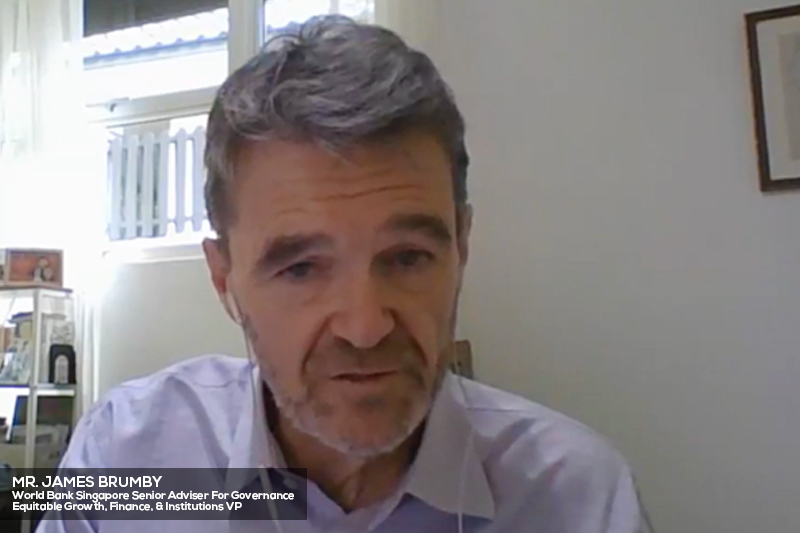 Gov'ts should reshape existing systems to adapt to the new normal Gov'ts should reshape existing systems to adapt to the new normal
Governments should reshape and shift their existing approaches to ensure the effective and efficient delivery of public services, especially in a crisis like the coronavirus pandemic.
Dr. James A. Brumby, Senior Adviser for Governance, Equitable Growth, Finance and Institutions VP of the World Bank Group Singapore, stressed this during the first of the four-part webinar series of the 6th Annual Public Policy Conference (APPC) titled "Innovation in Public Sector Governance for Resilience under a New Normal: Theory and Practice" held recently.
He noted that in many countries, the public sector has been found to be lacking in the overall response to the current pandemic. READ MORE
|
POLICY ISSUE AT A GLANCE
How Can PH Meet the Rising Demand for Data Workers?
With the advent of the Fourth Industrial Revolution comes the increasing demand for data science and analytics (DSA) workforce. DSA skills, however, remain underdeveloped among the Philippine workforce. This infographic answers the question: "Are the DSA-related undergraduate degree programs able to supply the current demands for DSA talents?" It provides evidence on the current DSA skill gaps, identifies specific DSA competencies, and recommends actions to address the challenges in preparing the future DSA workforce.
This infographic is based on PIDS Policy Notes titled "Aligning Higher Education with Demands for Data Science Workforce" written by Brenda A. Quismorio, Maria Antonette D. Pasquin, and Claire S. Tayco, PIDS consultants. The peer-reviewed full study is available as a PIDS Research Paper.
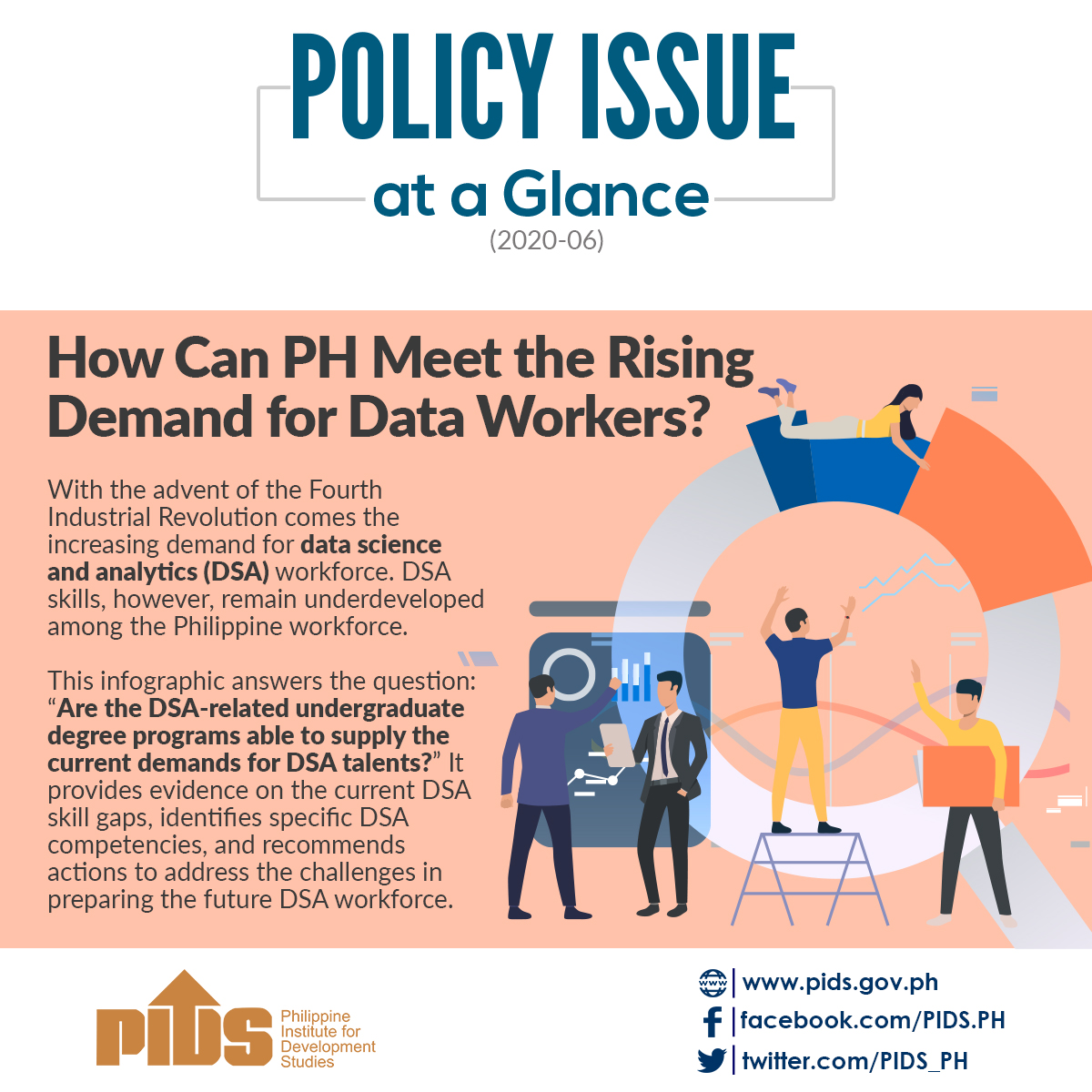 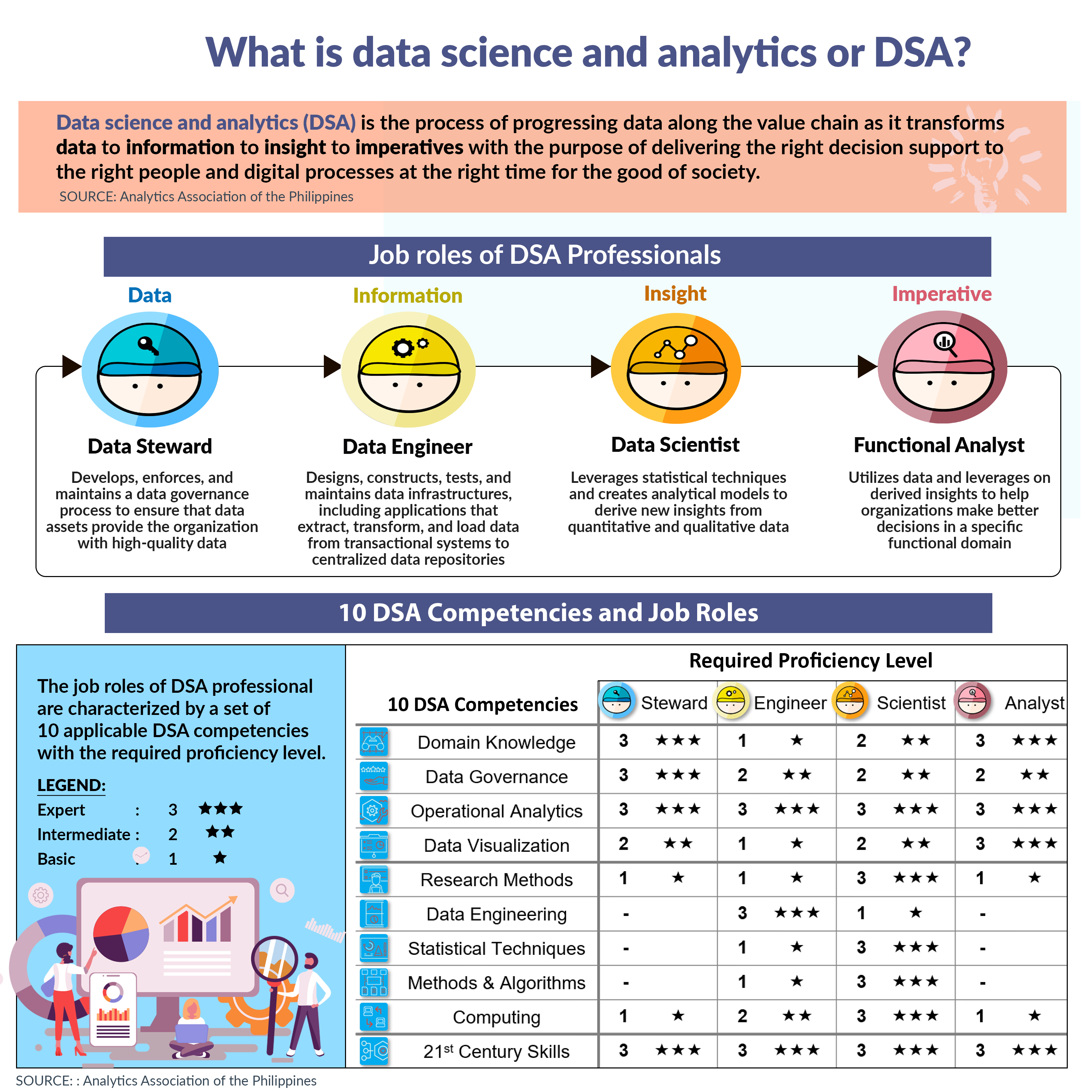 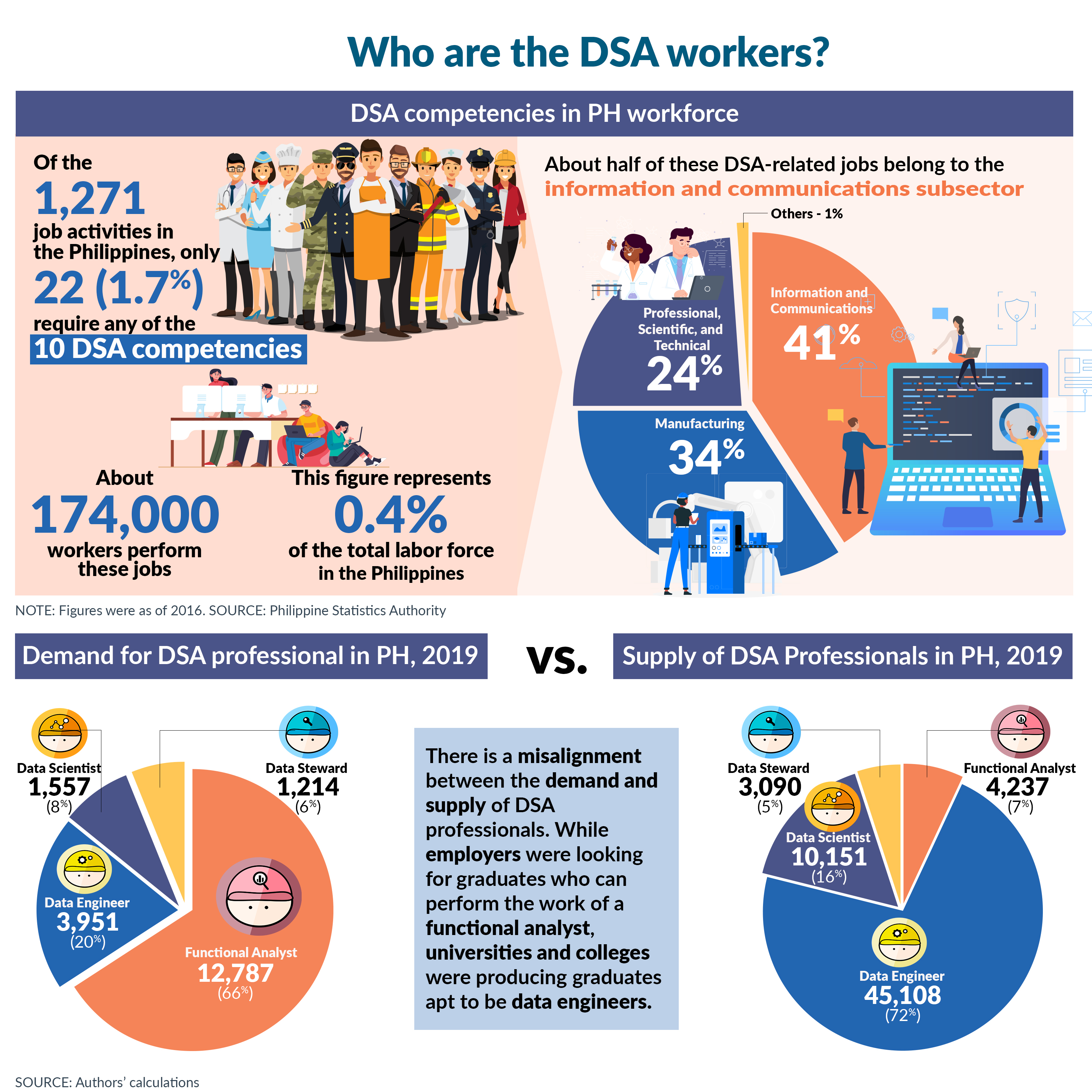
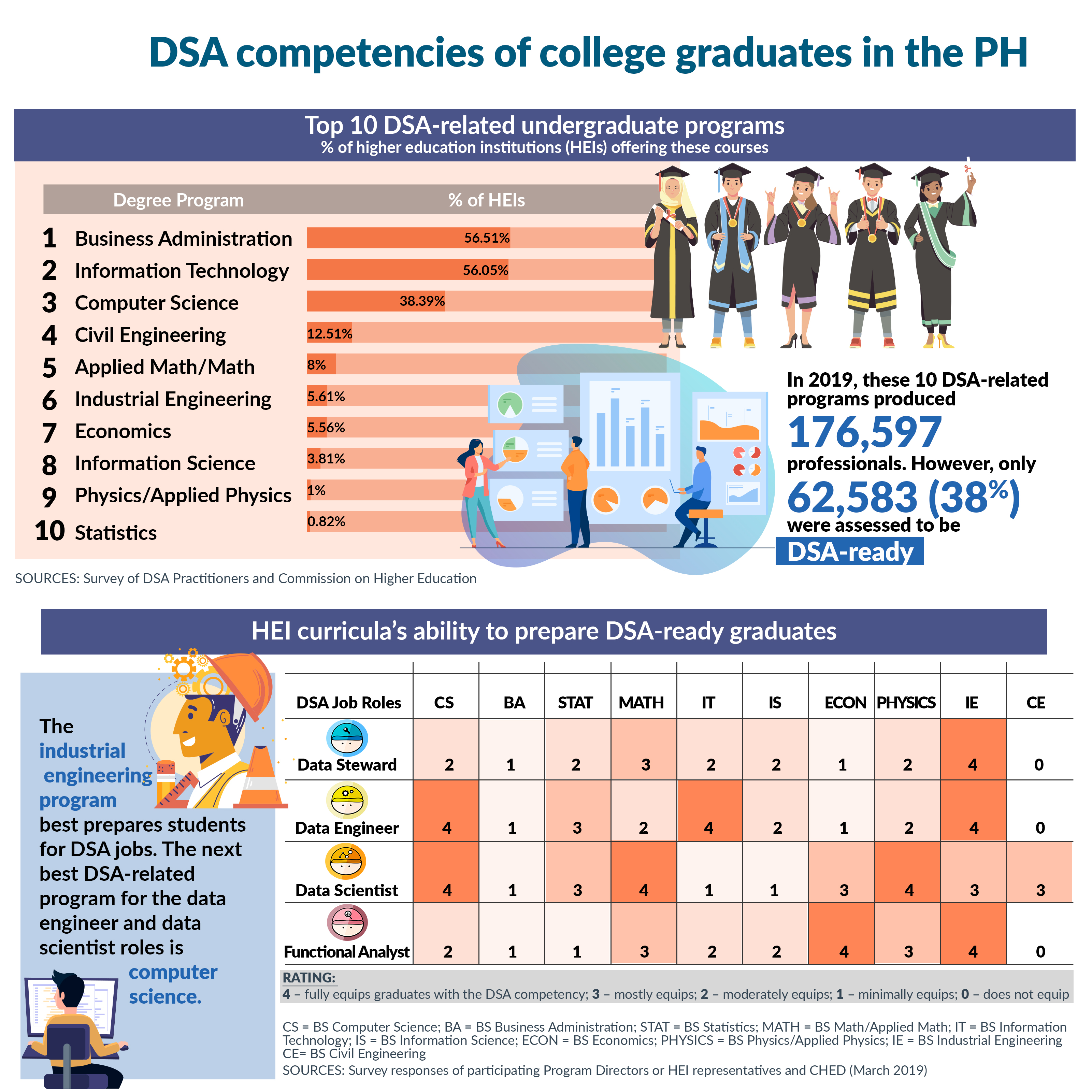
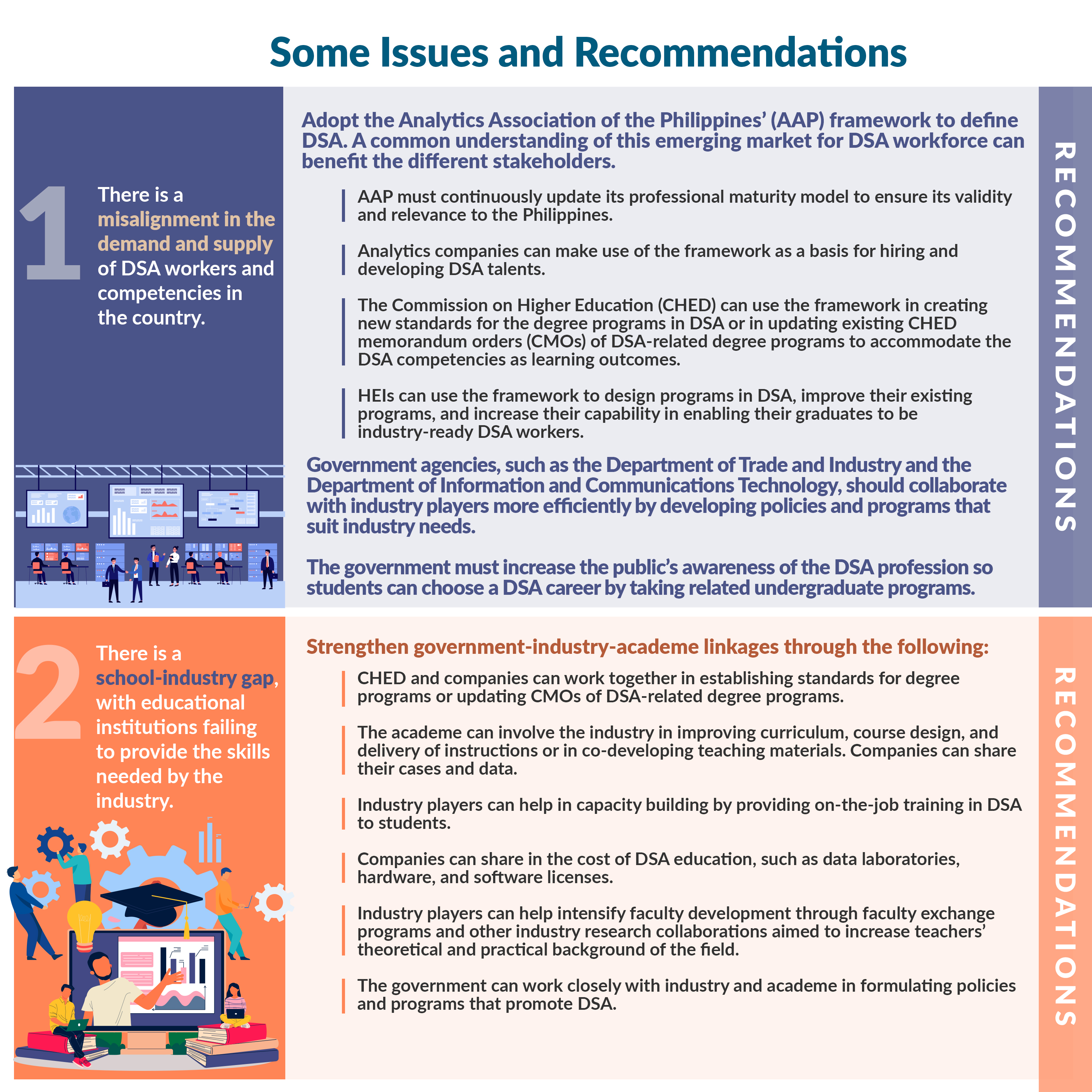
To view in actual size, visit the PIDS website or the PIDS Facebook page.
FACT FRIDAY
Every Friday, PIDS releases nuggets of research results culled from different PIDS studies. Here are the latest #PIDSFactFriday issues.
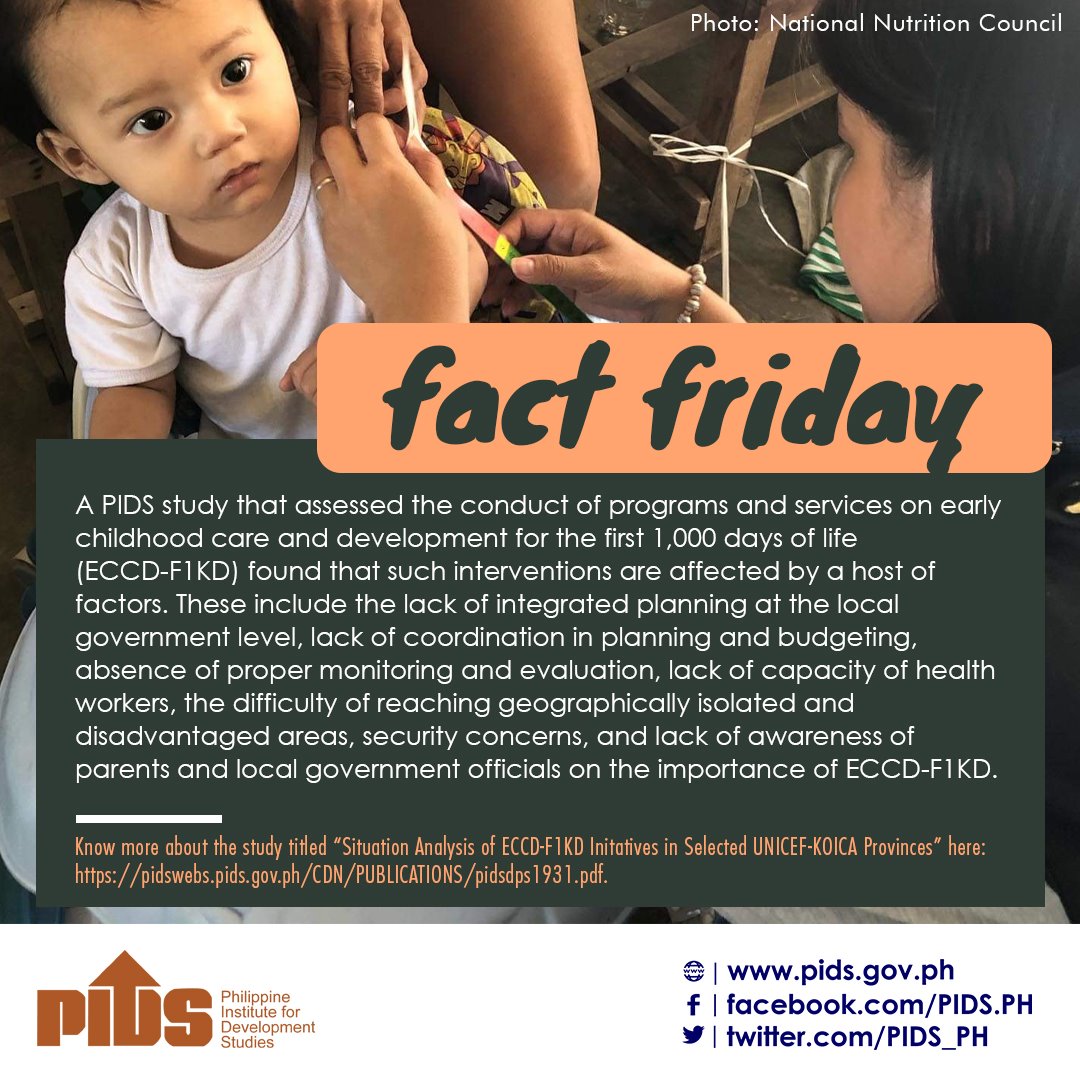 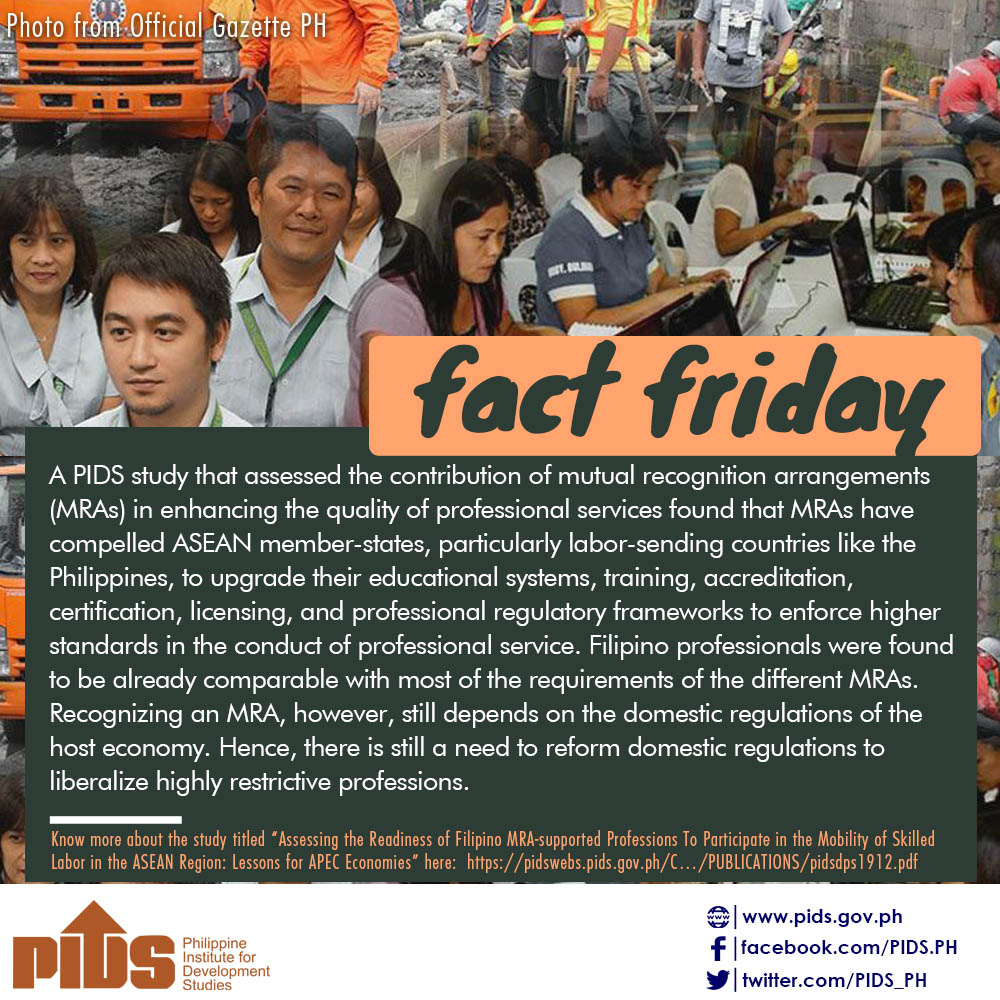 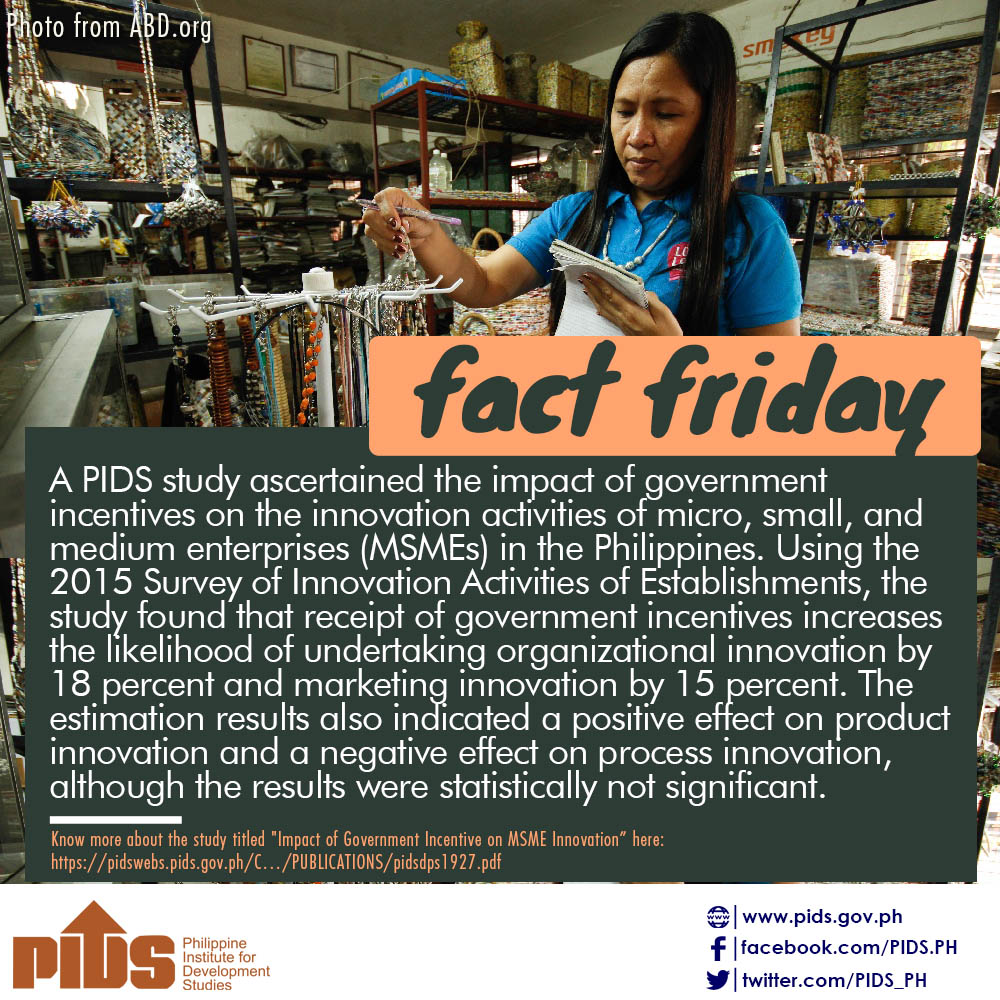 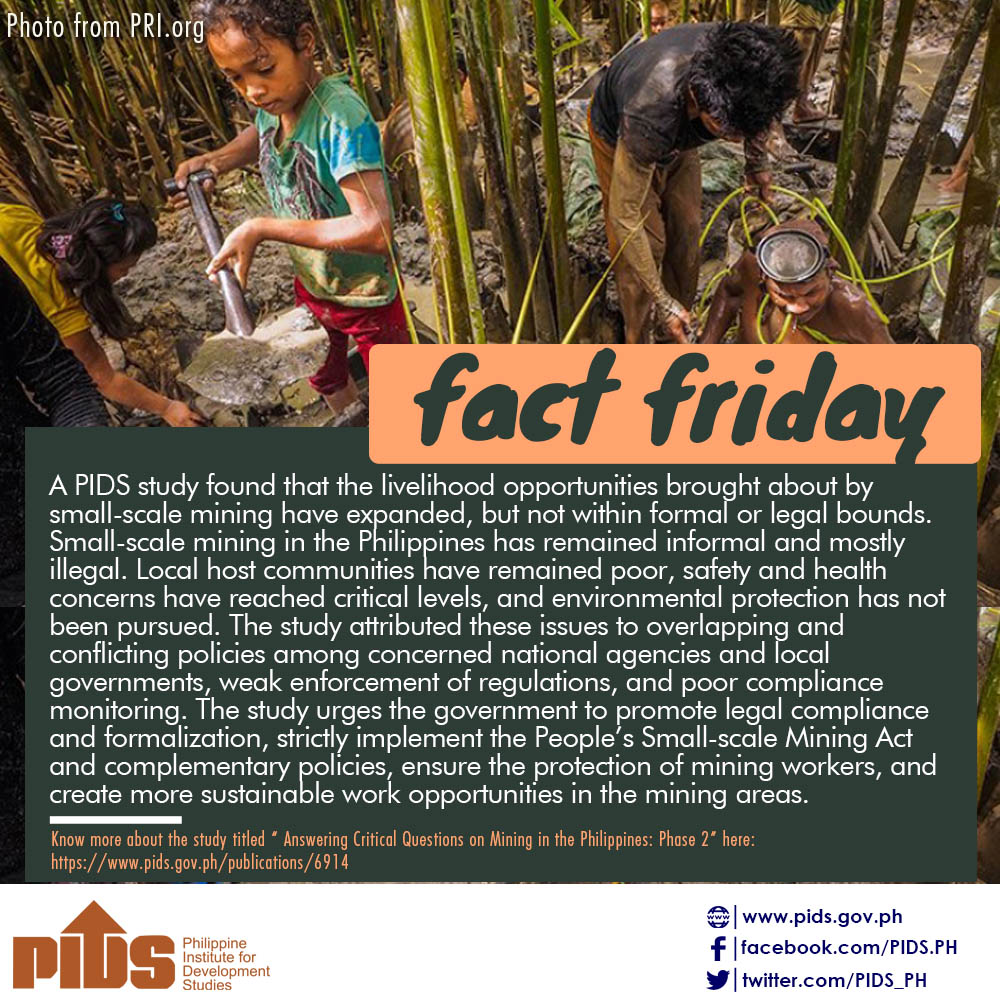
Like us on Facebook for more #PIDSFactFriday issues.
|






















